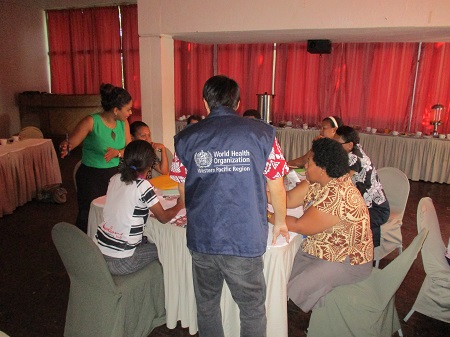Experts from the Fijian Ministry of Health and Medical Services (MoHMS) and WHO delivered a ‘Training of the Trainer’ course to 30 mental health specialists from all four country divisions on how to train colleagues to provide psychosocial support to victims of Tropical Cyclone Winston.
The training on 9-10 March focused on building capacity in psychological first aid. Fiji Red Cross and Empower Pacific attended the training and shared their experiences. The participants will now return to their district health facilities and begin training others.
“WHO is pleased to provide its expertise in delivering this important training,” said Dr. Yutaro Setoya, the mental health lead at the WHO in Suva and co-facilitator of the session. “We are equipping more and more health providers and other aid workers to give humane, supportive and practical help to people suffering from this terrible disaster.”

The MoHMS made psychosocial support a priority immediately following the cyclone, which tore through Fiji on 20-21 February. MoHMS is leading a Sub-Cluster dedicated to the issue. Other UN agencies, such as UNICEF and UNFPA, as well as international and local NGOs and donor partners attend the Sub-Cluster meetings. WHO has been providing technical support.
“A lot of psychosocial support is needed,” said Dr. Nirvana Karan, the head of the Psychosocial Support and Mental Health Sub Cluster. “We can’t train everyone at the same time. Fiji is made up of over 300 islands, so it’s easier for us to train the trainers. It’s evidence-based and quite practical. I’m extremely happy with how it went.”
Through a series of lectures, discussion and practical exercises, the training showed participants how to identify people suffering psychosocial problems, how to provide effective support to them and how to do so while taking care of their own well-being. The course draws on the widely-used Psychological first aid: Guide for field workers. Published by WHO in 2011, the guide has been endorsed by 20 international aid organizations.
“The training is very good,” said Misau Pranjiban, a community health nurse from Lautoka and coordinator of mental health services in the Western Division. “It reinforces the knowledge I have been using going out in communities. I find it very useful. We need to know exactly what we need to do because if you’re not careful, then you might be causing more harm than actually helping.”
Ms. Pranjiban said the course has changed her approach capacity building and she plans to return to her division and oversee the training of up to 60 nurses and others in the days to come.
MoHMS leads a sub-cluster group on mental health and psychosocial support to coordinate efforts with all partners, as part of the disaster response. MoHMS has also been communicating mental health advice to the public since the cyclone struck with regular radio messages, television spots, and social media updates.
It is generally estimated that disasters lead to a five percent increase overall in mental disorders among those affected. Disorder can include depression, anxiety, post-traumatic stress disorder, and psychosis.
The newly trained trainers have begun training their colleagues this week.




